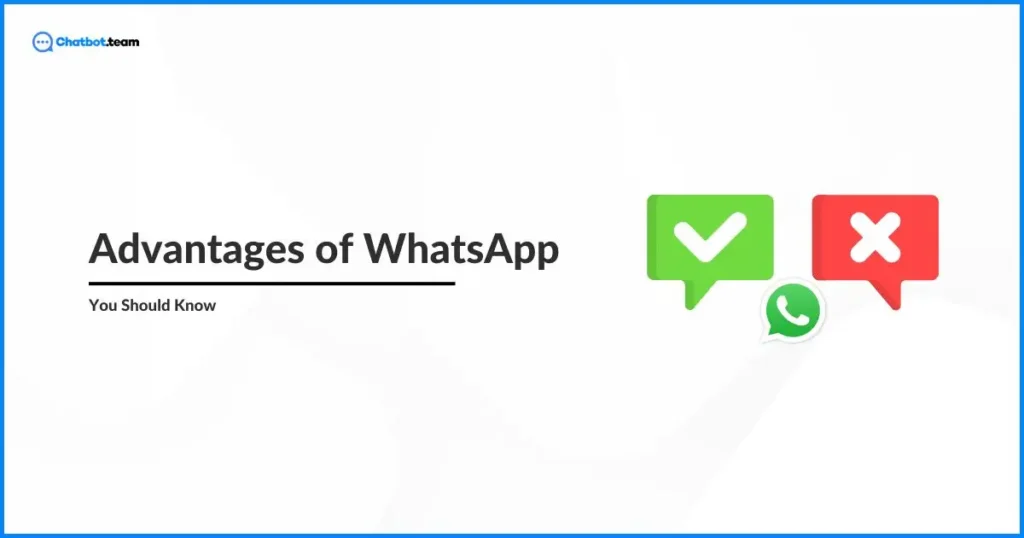WhatsApp has become one of the world’s most widely used messaging apps, connecting over 2 billion users across various countries. In 2009, WhatsApp revolutionized communication by offering a simple, reliable, and fast messaging service. Its popularity is driven by its user-friendly interface, the ability to instantly send messages, photos, and videos, and its commitment to keeping communication private with end-to-end encryption.
WhatsApp’s seamless integration across different platforms and cost-effectiveness have made it the go-to messaging tool for both personal and business communication. Whether chatting with friends, sharing updates with family, or managing customer inquiries for your business, WhatsApp has made staying connected easier than ever.
Today, we will discuss WhatsApp’s 11 advantages and disadvantages, giving you a comprehensive view of why this app is so popular and what potential downsides you should be aware of. By the end of this blog, you’ll have a clearer understanding of how WhatsApp can benefit you and where it might fall short.
11 Advantages of WhatsApp
WhatsApp has become an indispensable tool in modern communication, offering a range of features that cater to personal and business needs. Below, we explore the key advantages that make WhatsApp a preferred messaging app for millions around the globe.
1. Global Reach
One of WhatsApp’s standout features is its extensive global reach. With over 2 billion users in over 180 countries, WhatsApp lets you connect with people worldwide without worrying about international SMS charges. This widespread adoption means that whether you’re communicating with friends, family, or business clients, you’ll likely find them on WhatsApp, making it a universal platform.
2. Cross-Platform Availability
WhatsApp is available across various platforms, including Android, iOS, Windows, and web browsers. This cross-platform availability ensures that you can stay connected regardless of your device. Whether on your smartphone, tablet, or desktop, WhatsApp provides a seamless messaging experience, allowing you to switch between devices without missing a beat.
3. Ads Free Platform
In a world where most apps are cluttered with ads, WhatsApp stands out by offering an ad-free experience. Users can enjoy uninterrupted communication without the annoyance of pop-ups or banners. This focus on a clean user experience has contributed significantly to its popularity, allowing users to focus solely on their conversations.
4. Cost-Effective Communication
One of the most significant advantages of WhatsApp is its cost-effectiveness. The app allows users to send messages, make voice and video calls, and share media files without any charges beyond their internet connection. This makes it an affordable communication tool, especially for international calls and messages, which are accessible on WhatsApp.
5. High Message Open Rate
WhatsApp boasts an exceptionally high message open rate, often surpassing traditional communication methods like email. This high engagement level is particularly beneficial for businesses looking to connect with customers, as messages sent via WhatsApp are more likely to be seen and responded to quickly.
6. End-to-End Encryption
Privacy and security are top priorities for WhatsApp. The app uses end-to-end encryption to ensure only the sender and recipient can read the messages. This means that even WhatsApp cannot access the content of your conversations, providing users with a high level of security and peace of mind when sharing sensitive information.
7. Broadcast Lists and Groups
WhatsApp’s broadcast lists and group chat features allow users to communicate with multiple people simultaneously. Broadcast lists let you send the same message to many contacts individually, while groups enable collaborative discussions among friends, family, or colleagues. These features are beneficial for businesses managing customer communications or for anyone looking to organize events or discussions.
8. Live Location Sharing
The live location-sharing feature on WhatsApp is handy for coordinating meetups or ensuring someone’s safety. Users can share their real-time location with a contact or a group for a set period, making it easy to track movements and stay connected in real time. This feature benefits parents, friends, and business associates who must keep track of each other’s whereabouts.
9. User Friendly
WhatsApp is renowned for its user-friendly interface, which is easy to navigate even for those who are not tech-savvy. The app’s design focuses on simplicity and functionality, making it accessible to users of all ages. With one-click calling, simple media sharing, and intuitive settings, WhatsApp offers a hassle-free messaging experience.
10. WhatsApp Business Features
For businesses, WhatsApp offers a dedicated app—WhatsApp Business—which comes with additional features such as business profiles, quick replies, labels, and automated messages. These tools help businesses manage customer interactions more effectively, providing a professional communication channel that is both direct and personal.
11. Integration with Other Tools
WhatsApp integrates with various third-party tools and services, enhancing its functionality. For businesses, this means they can link WhatsApp with CRM systems, customer support platforms, and marketing tools to streamline operations. This integration capability makes WhatsApp a versatile tool that fits seamlessly into existing workflows, boosting efficiency and productivity.
10 Disadvantages of WhatsApp
While WhatsApp offers numerous advantages, it also comes with disadvantages that users should be aware of. Below, we explore some of the key drawbacks of using WhatsApp.
1. Limited Business Tools
Despite the introduction of WhatsApp Business, the platform still offers limited tools for businesses compared to more comprehensive CRM systems. Features like advanced analytics, customer segmentation, and automated workflows are not as robust, which can be a limitation for businesses that require more sophisticated customer management capabilities.
2. Privacy Concerns
Privacy has always been a significant concern with WhatsApp, especially after its acquisition by Facebook. Although the app uses end-to-end encryption, there have been ongoing debates and concerns about data sharing between WhatsApp and Facebook. Users worry about how their data might be used, particularly regarding targeted advertising and privacy breaches.
3. Dependency on Internet
WhatsApp’s functionality depends entirely on an internet connection through Wi-Fi or mobile data. This can be a disadvantage in areas with poor connectivity or for users who do not have consistent access to the internet. Unlike traditional SMS, which works without an internet connection, WhatsApp requires online access to send messages or make calls.
4. Risk of Account Suspension
WhatsApp has strict policies against spam, bulk messaging, and other activities that violate its terms of service. Accounts flagged for suspicious behavior risk being suspended or banned, sometimes without warning. An account suspension can be particularly disruptive and damaging for businesses relying on WhatsApp for communication.
5. Affects Mental Health
The constant availability and expectation of instant responses on WhatsApp can contribute to stress and anxiety. Users may feel pressured to stay connected and respond quickly, leading to “notification fatigue” and feeling overwhelmed. This constant connectivity can have adverse effects on mental health, particularly for those who struggle to maintain a work-life balance.
6. Usage of Storage
WhatsApp can quickly consume significant storage space on your device, especially if you frequently send and receive media files like photos, videos, and voice messages. Over time, this can lead to a cluttered device with reduced storage capacity, requiring regular cleanups to free up space.
7. Notification Fatigue
With the sheer volume of messages, notifications, and group chats, users can easily experience notification fatigue. Constant alerts can be distracting and overwhelming, making it difficult to focus on important tasks. This can lead to a negative user experience, particularly for those who are part of many active group chats.
8. Inconsistent Customer Support
WhatsApp’s customer support can be inconsistent, particularly for individual users. While businesses using WhatsApp Business may have access to some support resources, individual users often find it challenging to get timely assistance for issues like account recovery, technical glitches, or policy-related concerns.
9. No Content Censorship
WhatsApp does not have robust content censorship measures, meaning harmful or inappropriate content can spread unchecked. This lack of moderation can lead to the dissemination of misinformation, hate speech, or other harmful material, posing risks to users and communities.
10. Spreading of Fake News
WhatsApp has been a significant platform for spreading fake news and misinformation, particularly in regions with high usage rates. The ease of forwarding messages and the platform’s encryption make it difficult to trace the origin of false information, contributing to the rapid spread of rumors and fake news.
Conclusion
WhatsApp has undeniably transformed how we communicate, offering a range of features catering to personal and business needs. Its global reach, ease of use, and cost-effective communication make it a powerful tool in today’s digital age. However, like any platform, it is not without its drawbacks. From privacy concerns to the potential for misinformation, users must be aware of the limitations of this popular messaging app.
As with any tool, the key to maximizing WhatsApp’s benefits lies in understanding its advantages and disadvantages. By leveraging its strengths while being mindful of its potential pitfalls, users can make informed decisions about how best to utilize WhatsApp for their personal and professional communication needs.
Whether you’re using WhatsApp to stay in touch with loved ones or manage customer relationships, knowing these pros and cons will help you navigate the app more effectively and make the most of its offerings.


